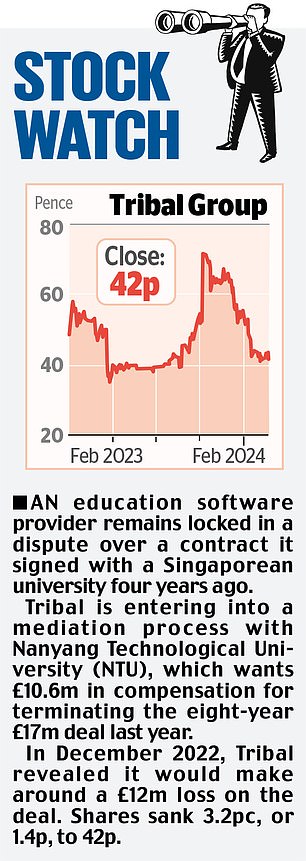A fintech firm is to replace its boss less than a year after its disastrous float on the stock market.
CAB Payments listed with a price tag of £850m in July but has since seen around £600m wiped off its value.
And now chief executive Bhairav Trivedi, who has been at the helm since January 2021, will leave his job following the firm’s annual results on March 26.
His successor Neeraj Kapur previously worked as finance boss at London-listed Vanquis Banking Group (up 0.3 per cent, or 0.4p, to 132p).
While Trivedi will take on a senior adviser role to CAB, his departure as chief executive comes following a turbulent time for the firm. Shares in CAB Payments – which helps its customers move money in emerging markets such as Bangladesh, Cameroon and Senegal – plunged by almost three-quarters in a single session in October last year after a thumping profit warning.

Disastrous float: CAB Payments listed with a price tag of £850m in July but has since seen around £600m wiped off its value
The stock, which floated at 335p, slid 2.6 per cent, or 2.6p, to 99.4p. It is valued at just under £260m. On the wider market, the FTSE 100 gained 0.3 per cent, or 21.79 points, to 7706.28 and the FTSE 250 lost 0.4 per cent, or 83.94 points, to 19179.56.
Across the Atlantic, the Dow Jones Industrial Average added 0.3 per cent in early trading and the S&P 500 rose 0.1 per cent. But the tech-heavy Nasdaq inched down 0.06 per cent.
Shares in Nvidia rose another 1.6 per cent, having jumped 16 per cent in the previous session.
The chipmaker saw its market cap gain £214billion on Thursday following bumper results. It was the biggest one-day increase in market value ever recorded.
Back in London, Bytes Technology published details regarding the shares traded by its boss that he failed to disclose since the IT software firm floated in December 2020. Neil Murphy, who joined the company as a sales director in 1997, resigned on Wednesday and told the board about his dealings.
The disclosure revealed 313,741 undisclosed shares were bought at 479.23p each and the same amount were sold at 483.46p. Shares slid 2.4 per cent, or 13p, to 532.5p.

There was little respite for WPP after the advertising giant lost the confidence of a City broker.
Morgan Stanley downgraded its rating on the stock a day after the company posted a huge slump in profits as big tech cut back on advertising. On Thursday, WPP said profits for 2023 hit £346m – down as much as 70 per cent from the year before. Shares edged down 0.1 per cent, or 0.6p, to 730p.
Domino’s Pizza was also on the receiving end of a broker downgrade. Barclays flagged concerns that a slowdown in app downloads, according to figures from the industry tracker Apptopia, could hit sales.
Nearly 80 per cent of Domino’s third-quarter online orders were made on its app. Shares slid 4.3 per cent, or 15.6p, to 351.6p.
Biotechnology company PureTech Health headed in the other direction after the company it founded remained on track to be bought by the US pharma giant Bristol Myers Squibb for $14billion during the first half of this year.
Karuna Therapeutics, which is developing a treatment for adults suffering from schizophrenia that is being reviewed by the US regulator, agreed the takeover in December 2023.
Shares in PureTech Health surged 11.6 per cent, or 22.1p, to 213.5p.
Gas and electricity supplier Yu Group has shored up its finances by striking a five-year hedging deal with Shell Energy.
The utility firm, which also installs smart meters for UK businesses, has been affected by volatile energy prices. Yu’s agreement with Shell Energy frees up more than £50m of cash that had been placed on its balance sheet as collateral. Shares soared 12.1 per cent, or 140p, to 1300p.



